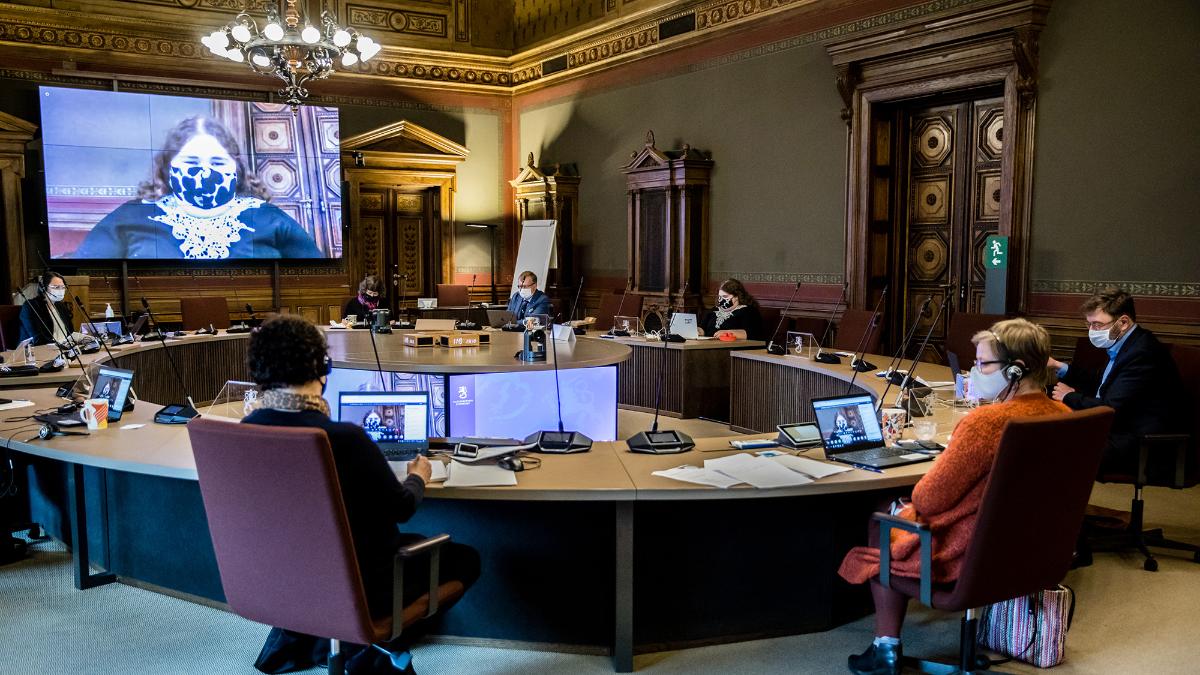Climate Policy Roundtable discussed ways to reduce transport emissions
Transition to fossil-free transport must take social justice, regional differences and competitiveness into account

On Wednesday 28 October, the Climate Policy Roundtable met to discuss a fair and just transition to fossil-free transport. The key focus was on measures to be included in the roadmap to fossil-free transport and distribution of the costs arising from emission reductions in the transport sector.
Introductions to the topics were given by Director of Unit Päivi Antikainen from the Ministry of Transport and Communications concerning the roadmap to fossil-free transport and Professor of Economics Matti Liski from the Aalto University concerning the impacts of carbon pricing. Minister of the Environment and Climate Change Krista Mikkonen chaired the meeting, which was also attended by Minister of Transport and Communications Timo Harakka.
The topics raised in the discussions included the diversity of means to reduce emissions, important role of financial steering, regional differences, different solutions for heavy goods vehicles and passenger transport, competitiveness of the export industry, and urban planning that promotes more equitable modes of mobility.
“For the past one hundred years traffic infrastructure has been built for cars and motorists. In future, our focus should be on modes of transport that promote sustainable mobility. Municipalities have a key role in this work. Adequate and affordable public transport services and good pedestrian and cycling networks are the best way to move towards a just transition,” says Ari Alatossava, Chief Executive of Ii who represents the network of municipalities that are committed to working for carbon-neutrality (Hinku).
Those present at the roundtable stressed that the transition must have broad support in society. Communication must be consistent and easy to understand for the people.
“All stakeholders must be involved in the prioritisation and impact assessments of the broad spectrum of means that are available. Investments are needed in the development of new technologies and synthetic fuels. Transport costs should remain reasonable, which means that raising fuel prices should only be used as the last resort,” says Helena Soimakallio, Executive Director of the Technology Industries of Finland.
For individual users, practical and smooth mobility is the key priority. Solutions that work in practice are also attractive and acceptable.
“Urban planning is needed to ensure that alternative modes of transport are a better option than using one’s private car. We also need smoother travel chains, and it should be easier to combine different forms of mobility. The transition must not lead to growing inequality, but everyone must have the opportunity to move about and fulfil their dreams,” says Laura Hildén, Chair of the Agenda 2030 Youth Group.
“In urban areas public transport services support a just transition. They are accessible to all independent of the income level, knowledge and skills or age, or whether one has a car of driving licence. The best way to ensure a just transition is to keep public transport services strong and competitive, also considering the financial difficulties caused by the coronavirus situation,” says Suvi Rihtniemi, CEO of the Helsinki Region Transport HSL.
Inquiries:
Riikka Yliluoma, Special Adviser to the Minister of the Environment and Climate Change, tel. +358 295 250 091, [email protected]
Ari Alatossava, Chief Executive of Ii, Hinku municipalities, tel. +358 40 567 6700, [email protected]
Helena Soimakallio, Executive Director, Technology Industries of Finland +358 40 550 7706, [email protected]
Laura Hildén, Chair, Agenda 2030 Youth Group, [email protected]
Suvi Rihtniemi, CEO, Helsinki Region Transport HSL, tel. +358 9 4766 4040, [email protected]
Merja Turunen, Senior Ministerial Adviser, Secretary-General of the Climate Policy Roundtable, tel. +358 295 250 387, [email protected]
The Government appointed the Climate Policy Roundtable on 27 February 2020. It brings together a broad spectrum of stakeholders from different sectors of society. The purpose of the roundtable is to create a common understanding of how Finland can make a just transition to a carbon neutral society even faster than envisaged so far. With its work, the roundtable supports the preparation and implementation of Finland’s national climate policy.
